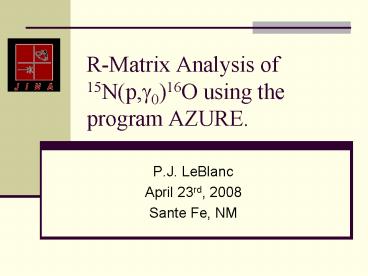RMatrix Analysis of 15Np,g016O using the program AZURE' - PowerPoint PPT Presentation
1 / 15
Title:
RMatrix Analysis of 15Np,g016O using the program AZURE'
Description:
Previous results published by Rolfs in 1974. ... 3.5 MV KN VdG accelerator. 1 MV JN VdG accelerator. Experimental Set Up _at_ ND: ... – PowerPoint PPT presentation
Number of Views:37
Avg rating:3.0/5.0
Title: RMatrix Analysis of 15Np,g016O using the program AZURE'
1
R-Matrix Analysis of 15N(p,g0)16O using the
program AZURE.
- P.J. LeBlanc
- April 23rd, 2008
- Sante Fe, NM
2
Outline
- Previous experimental data
- Experimental update of the 15N(p,g0) performed at
Notre Dame in April 2007 - Using AZURE to analyze the results
3
Experimental Background
- Previous results published by Rolfs in 1974.
- This data was re-analyzed using an early version
of AZURE by Ed Simpson. - Results indicated that the interference between
the resonances was critical in determining S(0).
4
New Experiment at Notre Dame
3.5 MV KN VdG accelerator
1 MV JN VdG accelerator
5
Experimental Set Up _at_ ND
- Used a Ge Clover Detector set up at 45
- Clover was used in Add-Back mode.
- Targets used were TiN, enriched in 15N, around 8
keV thick at 430 keV.
6
Experimental Results
7
AZURE Analysis Set Up
- Need Data files
- (p,g0) obviously, but any other data will help
constrain the parameters. - (p,p) (p,a0) data sets are also included
- Nuclear Physics Environment
- Spins and parities of particles involved
- Also energy levels and some initial values for
the gamma widths.
8
Current included Data Sets
- 15N(p,p)15N
- Hagedorn (1957) 160, 125, 90
- Bashkin (1959) 90 , 160.8
- 15N(p,g0)16O
- Notre Dame 2007 Data
- 15N(p,a0)12C
- Schardt (1952) 160
- Redder (1982) 160
- Zyskind (1979) 160
9
Nuclear Physics EnvironmentResonance
Transitions 12.442 13.091, 1- States
Elastic scattering
Gamma decay
Alpha decay
1-
1-
1-
E1
12Ca0
0
15Np
15Np
15Np
15Np
S0, l1
16Og
S0-, l1
S0-, l1
S1-, l0,1,2
S1-, l0,1,2
Starting parameters from TUNL
13.091 MeV State
12.442 MeV State
Indicates component not included by setting rwa
0.0. In, general, only the lowest l-value is
allowed
Indicates component excluded by parity
considerations.
10
Initial AZURE calculation (p,p)
11
Initial AZURE Calculation (p,g0) (p,a0)
- All calculations look very good using just the
literature values of the experimental partial
widths. - Note that no target integration or convolution
included. - So what does the fit look like?
12
First try for AZURE fit (p,p)
13
First try for AZURE fit (p,g0) (p,a0)
- Fits still need a little workbut look promising.
- C2 / point
- (p,p) 1.66
- (p,a0) .98
- (p,g0) 6.27
14
Closing Remarks Improving the fit
- Look into the (p,p) data
- Could be a problem with the scan
- Notre Dame (p,p) data available
- Adding the (p,a1) data would help
- Include the recent LUNA (p,g0) data
15
Thanks to Dick!
- Little did I know back in 2004 what I was getting
myself into!! - But working with the AZURE code under Dicks
guidance taught me more nuclear physics than I
could have hoped to learn in any class.































